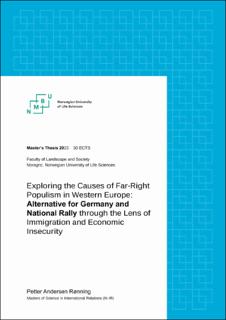| dc.description.abstract | Far-right populist parties are increasingly gaining influence in democracies across Western Europe. Two of Europe's largest and most crucial economies, Germany and France, have witnessed the emergence and growth of two far-right populist parties: Alternative for Germany and National Rally. This thesis aims to examine the emergence and growth of far-right populist parties AfD and RN, with a particular focus on the role of immigration and economic insecurity in shaping the electoral success of these parties. Using theories of economic grievances and the interaction between sociocultural and economic grievances, the thesis aims to broaden our understanding of how grievances play a significant role in voting for far-right populist parties. The thesis applied a data collection and qualitative case study method to compare and contrast the parties. To provide important insight into the factors that propelled the parties to become prominent far-right parties, a historical overview was undertaken. The thesis found that the internal conflict within AfD shifted the party's direction towards a more socially conservative and anti-immigration stance. The RN underwent a period of dédiabolisation, intending to achieve a softer party image while still maintaining its socially conservative policies. The findings highlight that both the AfD and the RN achieved remarkable electoral success in a short period using a Eurosceptic and anti-immigration platform. Both parties capitalized on crises in Europe such as the 2008 global financial crisis and the 2015 refugee crisis for electoral gains. These findings can be applied to the broader debate on the topic of far-right populism in Europe to better understand the social and economic factors that are driving support for far-right populist parties. | |
